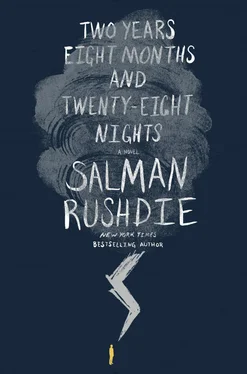Salman Rushdie
Two Years Eight Months and Twenty-Eight Nights
One is not a “believer” in fairy tales.
There is no theology, no body of dogma, no ritual, no institution,
no expectation for a form of behavior.
They are about the unexpectedness and mutability of the world.
George Szirtes
Instead of making myself write the book I ought to write, the novel that was expected of me, I conjured up the book I myself would have liked to read, the sort by an unknown writer, from another age and another country, discovered in an attic.
Italo Calvino
She saw the dawn approach, and fell silent, discreetly.
The Thousand Nights and One Night

El sueño de la razón produce monstruos
The sleep of reason brings forth monsters
( Los Caprichos, no. 43, by Francisco de Goya; the full caption in the Prado etching reads: “Fantasy abandoned by reason produces impossible monsters: united with her, she is the mother of the arts and the origin of their marvels.”)
The Children of Ibn Rushd


Very little is known, though much has been written, about the true nature of the jinn, the creatures made of smokeless fire. Whether they are good or evil, devilish or benign, such questions are hotly disputed. These qualities are broadly accepted: that they are whimsical, capricious, wanton; that they can move at high speed, alter their size and form, and grant many of the wishes of mortal men and women should they so choose, or if by coercion they are obliged to do so; and that their sense of time differs radically from that of human beings. They are not to be confused with angels, even though some of the old stories erroneously state that the Devil himself, the fallen angel Lucifer, son of the morning, was the greatest of the jinn. For a long time their dwelling places were also in dispute. Some ancient stories said, slanderously, that the jinn lived among us here on earth, the so-called “lower world,” in ruined buildings and many insalubrious zones — garbage dumps, graveyards, outdoor latrines, sewers, and, wherever possible, in dunghills. According to these defamatory tales we would do well to wash ourselves thoroughly after any contact with a jinni. They are malodorous and carry disease. However, the most eminent commentators long asserted what we now know to be true: that the jinn live in their own world, separated from ours by a veil, and that this upper world, sometimes called Peristan or Fairyland, is very extensive, though its nature is concealed from us.
To say that the jinn are inhuman may seem to be stating the obvious, but human beings share some qualities at least with their fantastical counterparts. In the matter of faith, for example, there are adherents among the jinn of every belief system on earth, and there are jinn who do not believe, for whom the notion of gods and angels is strange in the same way as the jinn themselves are strange to human beings. And though many jinn are amoral, at least some of these powerful beings do know the difference between good and evil, between the right-hand and the left-hand path.
Some of the jinn can fly, but some slither on the ground in the form of snakes, or run about barking and baring their fangs in the shape of giant dogs. In the sea, and sometimes in the air as well, they assume the outward appearance of dragons. Some of the lesser jinn are unable, when on earth, to maintain their form for long periods. These amorphous creatures sometimes slide into human beings through the ears, nose or eyes, and occupy those bodies for a while, discarding them when they tire of them. The occupied human beings, regrettably, do not survive.
The female jinn, the jinnias or jiniri, are even more mysterious, even subtler and harder to grasp, being shadow-women made of fireless smoke. There are savage jiniri, and jiniri of love, but it may also be that these two different kind of jinnia are actually one and the same — that a savage spirit may be soothed by love, or a loving creature roused by maltreatment to a savagery beyond the comprehension of mortal men.
This is the story of a jinnia, a great princess of the jinn, known as the Lightning Princess on account of her mastery over the thunderbolt, who loved a mortal man long ago, in the twelfth century, as we would say, and of her many descendants, and of her return to the world, after a long absence, to fall in love again, at least for a moment, and then to go to war. It is also the tale of many other jinn, male and female, flying and slithering, good, bad, and uninterested in morality; and of the time of crisis, the time-out-of-joint which we call the time of the strangenesses, which lasted for two years, eight months and twenty-eight nights, which is to say, one thousand nights and one night more. And yes, we have lived another thousand years since those days, but we are all forever changed by that time. Whether for better or for worse, that is for our future to decide.
In the year 1195, the great philosopher Ibn Rushd, once the Qadi, or judge, of Seville and most recently the personal physician to the Caliph Abu Yusuf Yaqub in his hometown of Córdoba, was formally discredited and disgraced on account of his liberal ideas, which were unacceptable to the increasingly powerful Berber fanatics who were spreading like a pestilence across Arab Spain, and sent to live in internal exile in the small village of Lucena outside his native city, a village full of Jews who could no longer say they were Jews because the previous ruling dynasty of al-Andalus, the Almoravides, had forced them to convert to Islam. Ibn Rushd, a philosopher who was no longer permitted to expound his philosophy, all of whose writing had been banned and his books burned, felt instantly at home among the Jews who could not say they were Jews. He had been the favorite of the Caliph of the present ruling dynasty, the Almohads, but favorites go out of fashion, and Abu Yusuf Yaqub allowed the fanatics to push the great commentator on Aristotle out of town.
The philosopher who could not speak his philosophy lived in a narrow unpaved street in a humble house with small windows and was terribly oppressed by the absence of light. He set up a medical practice in Lucena and his status as the ex-physician of the Caliph himself brought him patients; in addition he used what assets he had to enter modestly into the horse trade, and also financed the making of the large earthenware vessels, tinajas, in which the Jews who were no longer Jews stored and sold olive oil and wine. One day soon after the beginning of his exile a girl of perhaps sixteen summers appeared outside his door, smiling gently, not knocking or intruding on his thoughts in any other way, and simply stood there waiting patiently until he became aware of her presence and invited her in. She told him that she was newly orphaned; that she had no source of income, but preferred not to work in the whorehouse; and that her name was Dunia, which did not sound like a Jewish name because she was not allowed to speak her Jewish name and because she was illiterate she could not write it down. She told him a traveler had suggested the name and said it was from Greek and meant “the world” and she had liked that idea. Ibn Rushd the translator of Aristotle did not quibble with her, knowing that it meant “the world” in enough tongues to make pedantry unnecessary. “Why have you named yourself after the world?” he asked her, and she replied, looking him in the eye as she spoke, “Because a world will flow from me and those who flow from me will spread across the world.”
Читать дальше















